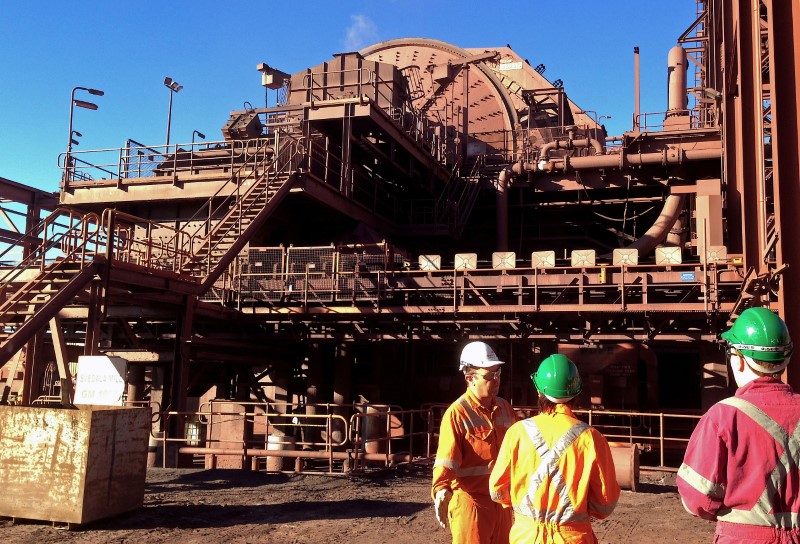By James Regan and Barbara Lewis
SYDNEY/LONDON (Reuters) - Global mining heads may have thought they'd seen it all in the last five years, navigating a recovery after a commodities boom turned to bust. As the cycle turns, it brings a new challenge: tackling growth in an industry still scarred by its excesses.
It comes just in time for Ken MacKenzie, who starts as chairman of BHP (L:BHP), the world's biggest miner, on Sept. 1. Like peers Rio Tinto (AX:RIO) (L:RIO) and Glencore (L:GLEN), BHP has just racked up its best profit and cash flow in years on rising global demand for staples likes iron ore and coal.
But this time, amid the cash piles, investors are reminding miners of messy mega-deals that cost previous executives their jobs. With activists like Elliott Management in their ranks, those investors want miners to balance investment in new and existing deposits with decent dividends, and a pledge to keep debt under control.
"Greater returns are warranted to some degree, and it's what everyone ultimately wants," said Bennelong Australian Equity Partners manager Julian Beaumont, who manages shares in BHP. "But at the same time there has to be discipline with enough capital available to grow and control debt."
Sober investment may be familiar territory for MacKenzie, a 53-year-old Canadian veteran of the packaging industry, who was hired in June to succeed former Ford Motor Co (N:F) head Jac Nasser.
But close scrutiny of how he, BHP Chief Executive Andrew Mackenzie (no relation) and their peers at Rio and Glencore spend profits will be a test in mining's brave - lean - new world.
BHP, Rio and Glencore declined Reuters' requests for comment for this story.
DEBT FOCUS
Just a few years ago, with China's economy surging, miners went on a buying spree: the high water mark was Rio's acquisition of aluminium producer Alcan for $38 billion (29.49 billion pounds). About the same time, former BHP CEO Marius Kloppers was lining up an $80 billion spending budget.
Now, investors want cleaner balance sheets. Big projects are necessary - reserves must be replenished and are ever tougher to find. But ambitious ones like BHP's Jansen potash mine in Canada need to be tackled with partners - hence efforts to sell a $2 billion stake.
"Commodities prices have helped with cash and we're seeing dividends, but things can turn very quickly, so I'd expect to see some prudence on their part," said Jason Beddow, chief executive at Argo Investments, which holds BHP and Rio shares. "I'd like to see them focus on paying down debt. BHP's MacKenzie held around 100 meetings with shareholders, including Elliott, to sound out concerns before his official start as chairman, BHP has said. In August Elliott became the second-biggest investor in BHP's London-listed arm, giving the fund the power to propose resolutions seeking board changes. Pressure from activists to shake up boardrooms cost the scalps of two BHP directors last week, both with long careers in oil and gas.
Elliott declined Reuters' requests for comment for this article.
THE HARDEST LINE The first in deep trouble when things went sour, Rio was also the quickest to recover.
Of the big three, Rio's shares are performing closest to benchmark indices and it now has the strongest balance sheet of the majors - something CEO Jean-Sebastien Jacques, appointed in July 2016, insists he will nurture with conservative targets on capital expenditure.
A number of fund managers contacted by Reuters for this article said Glencore had taken the hardest line in resisting richer payouts for investors. Glencore declared a flat first-half dividend, despite generating $2.5 billion in profits from higher coal, copper and other commodity prices.
Unlike the other mining bosses, Glencore's CEO Ivan Glasenberg is a major shareholder - but also one of the few remaining executives with a track record of opportunistic deals. For now, Glasenberg says his priority is keeping an investment grade rating by limiting debt and boosting returns.
'IS THAT SMART?'
A key indicator for how miners handle the new investor ambience will be how BHP deals with its $20 billion foray into shale deposits in the United States, an asset bought a half-decade ago in a world of high oil prices. BHP is alone among the big three with assets in this field. Widely diverging views on how BHP should handle this show how tough it may be to keep investors happy.
At the prodding of investors triggered by Elliott, BHP said in August the business was now under review and may be sold, at the right price. But with oil (CLc1) trading below $50 a barrel, sector consultants Rystad Energy estimated the division is worth only $5.1 billion.
"BHP wants to sell shale at the bottom of the cycle," said Ben Clark, a fund manager for TMS Capital who manages Rio shares, adding shareholders would see returns battered.
"Is that smart?"
(For a graphic on 'Mining sector spending' click http://fingfx.thomsonreuters.com/gfx/rngs/BHP-MINING-INVESTORS/010050LL1ED/BHP-MINING-INVESTORS-01.jpg)
